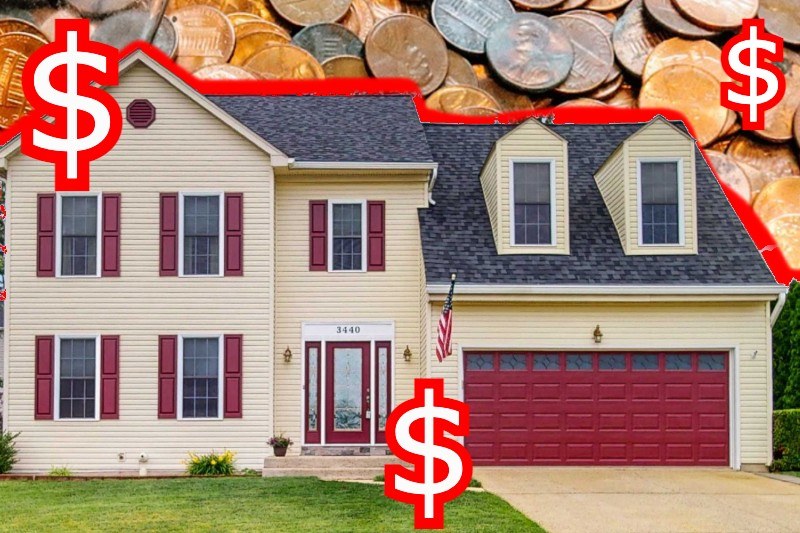
10 Common Mistakes When Searching for a Home
Posted on Dec 12, 2022
The journey to finding your dream home is filled with excitement and anticipation, but it can also...

Posted on Dec 12, 2022
For would-be homeowners, the home buying process can feel complicated, stressful, and confusing. Even existing homeowners often feel this way despite having gone through the home buying process before. That’s because home purchases are infrequent, yet extremely important - as they often represent a good chunk of one’s net worth. And on top of that, there’s plenty of conflicting information out there.
From start to finish, the home buying process will take about 90 days on average - that’s 50 days to get under contract, and about 40 days to close on it if you’re financing your home through a lender.
Here's the step-by-step process to buying a house, and becoming a homeowner.
Jump to section:

Timeline: 1-4 weeks
Your agent is your biggest asset when it comes to buying the home of your dreams, in a price range you can afford. People often question the role of the agent and whether or not they’re truly useful. In reality, though, buying a home is a complex process. On average, there are about 180 sheets of paper you need to understand, fill out, and/or sign.
Finding an experienced, communicative agent is important because good negotiating can save you thousands of dollars.
If you’ve never bought a home before, you might assume there’s a way to cut costs by getting rid of the commission fees. However, Realtors are “free” for buyers because it’s the seller who pays the agent fees.** You’ll be responsible for other closing costs, but not this one!
Almost everyone knows someone who is a real estate agent. This can be really beneficial if that person is extremely qualified. It can also be extremely messy and put a strain on relationships if the person doesn’t have much experience, or if things go sour on the deal. It’s worth asking yourself not only if the person is qualified to do the best job, but also: would your relationship be okay if they made a mistake that cost you financially?
Make sure that you’re comfortable with the agent’s skill level and don’t feel guilty about hiring someone else for financial reasons or because you want to protect your relationship.
The minimum qualifications for real estate agents are just that - fairly minimal. Some states just require a course that takes fewer hours than a single 40-hour workweek, along with passing the state licensing exam.
The ease of obtaining a license has led to many inexperienced and part-time agents flooding the market. Some people do part-time real estate work as a way to pass time or keep themselves busy during retirement. Helping clients buy homes might not be their only obligation, leading to communication issues down the road.
Houwzer recognizes that training and oversight are necessary in order to provide clients with better insight and support, advocate effectively in negotiations, protect the customer throughout the process, and counsel them through complicated transactions. Every agent at Houwzer must first go through extensive training, even if they’ve already worked in the field, before ever working with a client. In addition, all agents are full-time, salaried employees.
Although all Realtors are real estate agents, not all agents are Realtors. Realtors are agents who must adhere to a stricter code of ethics set by the National Association of Realtors. For this reason, working with a Realtor is ideal.
Check out our 12 Questions to Ask a Realtor Before Buying a House post in order to ensure that you and your agent are the best fit for each other.
Ready to talk to a Realtor?

Timeline: 1-3 days
Without a budget, you can’t move forward with your home search. This will determine which homes you can afford, and what sort of home loan will work best for you.
The majority of housing experts agree that you should cap your budget at no more than 28% of your total income (and 36% on total debt) - and sometimes, you’ll want to go lower than this. Otherwise, you risk becoming “house poor,” which is when too much of your monthly income is going to your mortgage and you have less ability to spend on other things or save.
When it comes to buying a house, there are a few key numbers you’re going to need to nail down to determine your budget.
You’ll need to define:
To get a very rough idea of your budget, you can use a mortgage calculator and plug in your home price, down payment, location, etc. The best way to determine your budget, though, is to meet with a mortgage advisor - they’ll be able to ensure you’ve accounted for taxes, existing debt, interest rates, and more correctly.
Your budget and the amount the lender approves are not necessarily the same thing. Based on your financials, for example, you might qualify for a home that would cost you $3,000 per month. If you're more comfortable spending $2,200 per month on housing, however, you shouldn't shop at your maximum simply because you can!
Two different people can both buy a $300,000 home, yet have different monthly payments. How? There are multiple factors that go into this number. Properties with an HOA fee, for example, can have monthly payments that are several hundred dollars more than a comparable property with no HOA fee. The mortgage term you opt for can also make a difference - a 15-year mortgage will save you money over the length of your loan (because the interest rate is lower), but you’ll pay more every month. Taxes also make a difference: a home in one neighborhood can have a different annual tax rate than a home in another neighborhood.
Figuring out your maximum monthly payment will help you narrow down which homes and neighborhoods are the right fit for you.
Although many first-time homebuyers are convinced that they should put down 20% on their home, there are advantages and disadvantages to doing so.
The average first-time home buyer, in fact, only puts down 6%.
The major advantage of putting down 20% is that it lowers your debt burden, and ensures you spend less on interest. Putting 20% down can also make you appear more financially stable to a home seller.
The disadvantage to putting 20% down is that waiting isn't free. You'll still pay thousands of dollars in rent while you save - and home prices will continue to appreciate. The mortgage rate might also rise.
When you don't have 20% down, you have to pay PMI (Private Mortgage Insurance). When buyers crunch the numbers, PMI is often less expensive than waiting and saving. And after you reach 20% equity in your home, this fee typically goes away.
“Sometimes mortgage insurance is required if you wish to be a homeowner. That is, if you do not have the conventional 20% down payment. Without mortgage insurance, homeownership would not be attainable for many homebuyers,” explains Houwzer mortgage advisor Julian Minatel.
Advantages of 20% Down Payment:
Disadvantages to 20% Down Payment:
First-time home buyers often don’t realize that closing costs are separate from the down payment, so it often becomes necessary to put the money they saved for the down payment towards closing costs instead. More on that below.
For more information, visit our guide How Much to Put Down on a House: the Problems with 20% and also How to Save for a House: What First Time Home Buyers Should Know.
A mortgage pre-approval letter tells you how much money a lender is willing to let you borrow for a home.
Homes on the market today can sell quickly. If you wait to get pre-approved until after you view your perfect home, it might be under contract by the time your paperwork goes through. Getting your mortgage pre-approval letter is also important for knowing your true budget so that you’re looking at homes you can actually afford.
Two people making $80,000 a year could be approved for two different loan amounts. Why? If one person is already paying $500 a month for student debt, then they won’t be approved for as much house as the person who only has $100 a month in existing debt.
To determine pre-approval, a loan officer will review:
Nowadays, it’s often possible to do this entire process online - even with a traditional lender.
Just because you use one lender for the pre-approval letter, it does not mean you need to use that same lender for your actual mortgage. A pre-approval letter is usually good for 30-90 days, depending on the lender.
“It’s important for homebuyers to get approved so that they know their true buying power - so they’re not spending their time searching and physically looking at properties they can’t actually afford," advises buyer agent Larry Lantz.
The mortgage rate is the interest rate you'll pay on your loan. The average interest rate may not be the exact same interest rate you receive from a lender. This is because rates fluctuate hourly, and because lenders factor in your credit score, loan structure (fixed or ARM, for example), and the term length of your loan when offering the rate.
Many people don’t realize that it pays to shop around for different rates. Some lenders will offer a better deal than others, which can translate into thousands of dollars over the lifetime of your loan. At Houwzer, mortgage advisors do the shopping around for you, finding the best mortgage and rate for your unique situation.
Want to get a better mortgage rate?
ARMs got a bad rap in the housing crisis, but they can actually be a useful option for "house hacking" a lower rate. They typically have a 1-2% lower start rate than the traditional fixed-rate loan, but you'll still have a fixed rate for the first several years. A 7/1 ARM loan, for example, has a set rate for the first 7 years. This often makes sense for buyers who don't plan on living in their home for the entire loan term.
What are closing costs? These are fees for services required by the lender or the real estate contract in order to close on the home. Inspections, transfer taxes, survey fees, mortgage recording fees, and appraisal fees are all considered closing costs. But remember, it’s the seller who pays for the agent commissions.
Although on average closing costs for buyers range from 2% to 5% of the total loan amount, this number varies widely by state and a number of individual factors (like whether or not the buyer is responsible for HOA fees). This means that for a $600,000 home, buyers should plan on paying somewhere from $12,000 to $30,000 in closing fees.
Here are the average prices for several common closing fees:
This list is not exhaustive and items like attorney fees and lead-based paint inspections will be required or recommended for some transactions, but not all.
It’s important to estimate high for closing costs since many of these fees, like a home inspection, need to be paid immediately out of pocket and are non-refundable (if you back out of a home sale because of the results of an inspection, you’ll still be out the cost of the inspection).
Before buying a home your Realtor will give you an estimate for the closing costs, so you won't be flying blind.
If there isn't a lot of competition, you might be able to get the seller to agree to pay for some of your closing costs - but it's hardly guaranteed.
“Buyers often have no idea that there are even closing costs to begin with,” observes Orlando-based buyer agent Daniel Robinson. “Closing costs are quite detailed, and they are on an individual basis so it’s not like a one-size-fits-all price.”

After you find an agent you like, you’ll have a consultation with them.
Having an initial buyer consultation with your agent will help you establish exactly what you’re looking for and why, so that you won’t end up wasting your time looking at homes you’d never feel comfortable in. These consultations typically take about an hour.
There are a few major topics you should make sure to discuss during this initial conversation. They include:

In your consult conversation, make sure to establish:
Know your must-haves (I need to have a yard for the dog), your want items (it would be nice to have a laundry room), and your deal-breakers (a long commute to the city is not going to work).
To begin your home search process, commit to seeing a variety of homes first. This will help your agent better understand what features you really want to prioritize, as well as which drawbacks are non-negotiables for you. This will also help you familiarize yourself with the local market so that once you’re ready to put down an offer, you’ll be able to contextualize whether it feels like a good deal or overpriced for the size, location, condition, etc. compared to the other homes you’ve seen.
According to Realtor, the average home buyer will visit 10 homes before finally landing on “the one.”
Timeline: Up to 10 weeks or more
So how exactly do you take the next step in the process? In most cases, your agent will forward you a list of homes they think may interest you. You might also be checking out homes on the MLS and asking your agent whether they’re worth seeing. In a competitive market, your agent may suggest some homes that hit most of your criteria, but not all.
Attending showings can be a good way to figure out how flexible you can be about what you want (or how much more you’re willing to spend to get all of your must-haves in one place).
“After a handful of showings, I have a very good idea of what my buyers are looking for. At that point when they send me properties, if I know there’s something with that property that isn't going to work for them, that’s when I start to hold them accountable,” explains Philadelphia buyer agent Sommer Mateer. “If they’re sending me a property that’s 1,200 square feet, but we just viewed a house that’s 1,500 square feet and they felt it was too small, then I bring that up. That’s when we start to really refine what type of home we’re looking for.”
Once you’ve decided to view a home, your agent communicates with the listing agent to see when the home is available for showings. Afterward, they will meet you at each house and show you around. Most people spend around 15-30 minutes at each house showing. The more flexible you can be, the better: if you wait too long to view a home, it might go to “sale pending” before you get a chance to see it.
You can also attend open houses on your own. However, it’s a good idea to have a Realtor before you go to open houses - that way if you like the house, you can arrange for a private showing later.
Although ideally once you find a home you like, you’ll view it a second time before making an offer, this isn’t always possible - so take photos/videos (if allowed) and notes the first time through. Once you find the right home for you, it’ll be time to make an offer - usually within a few days of viewing the home.
Familiarize yourself with common home issues so that you know what to look out for - whether that’s cracks indicating foundation issues, or the tell-tale signs of insects in Southern states. Your agent can also be a huge asset in identifying some of the more visible problems before you put down an offer and have to pay for a home inspection.
“Online pictures can be misrepresentations of the property and going in person allows you to see homes up close and personal,” explains Florida-based Realtor Kaynea Bingham.
Many of these issues will be listed on the property disclosure. Although the home seller won’t always offer the disclosure prior to an offer, your buyer agent can request it from the listing agent and they will typically comply. In most states, home sellers are required by law to disclose any issues with the home that could have an impact on a home’s value or that creates unreasonable risk.
For example: a broken hinge on a cupboard door wouldn’t need to be disclosed, but a leaky roof would be.
Here are some common home issues to look out for when touring homes (though this is just a start!):
There’s more to a home than simply the roof, foundation, etc. Everything from neighbors to nearby developments can impact your quality of life and future property value. A good agent will be able to keep you aware of issues beyond the home that you might not initially notice.
Your agent will also introduce you to comparable properties, or comps. Comps show you how much people have been willing to pay for nearby properties in the recent past. This can help you determine what a good offer is for a home; it will also give you an idea of what the home will appraise for, since appraisers rely heavily on comps to help determine current value.
What about the Zillow Zestimate/Redfin Estimate? Online home valuation tools give estimates - not appraisals. Redfin's median error rate for on-market homes is 3.02%, while Zestimate's is 1.9%. Use them as a guide, but understand that they can be off by many thousands of dollars.
If you want to avoid buyer's remorse, research your home and the surrounding area fully. You're likely committing to living in this area for several years.

Following your Realtor’s guidance is key when it comes to making an offer that is both competitive and fair. You want to give yourself a fighting chance without signing away important protections.
First, you need to decide how much to offer - and there’s no “right” or “wrong” number. This number will rely on:
For example: if you know you need to ask for contingencies (like the ability to decline the sale based on anything that comes up in the inspection) then you may need to offer more money in order to stay competitive.
On the other hand, if you’re a cash buyer and you suspect the seller needs to move quickly, your agent might recommend offering less (without a mortgage the home can close quicker, which might be very appealing to the seller).
It makes sense to offer more than the asking price if:
It makes sense to offer the asking price if:
It makes sense to offer under the asking price if:
Each house is unique and every local market is different, so if you have a knowledgeable and experienced Realtor, follow their advice. However, what you submit in your offer is ultimately 100% up to you - your Realtor can only advise you, not dictate the terms.
You’ll need to submit an offer letter, which is a legal document. Home offers generally follow the Agreement of Sale (AOS) and usually include:
A popular practice lately is to submit a personalized “love letter” to the seller along with your offer. Some agents now advise against doing that because they can inadvertently contribute to housing discrimination (and therefore, potential legal headaches as well). Details about your race, gender, religion, and even familial status could all lead to potential violations of fair housing laws.
If you do decide to write a letter, never include a photo, and try to keep as much personal information out of the letter as possible.
“If we’re in a 10-offer situation and I know a bunch of offers are going to have letters, I encourage them to do it. I want no stone overturned with our offer. What I tell my buyers to do is talk about the house, and talk about the neighborhood instead of talking about themselves,” says Sommer. “Compliments get you everywhere: that sort of mentality.”
A contingency is a condition that must be met for the sale to go forward. In a hot seller's market, you want to limit contingencies in order to keep your offer competitive. Here are contingencies that you could ask for:
According to a poll conducted by the National Association of Realtors, this is the most common contingency, involved in 58% of closed sales. Typically the contingency stipulates that if unknown issues are uncovered, the buyer has the option to request repairs or negotiate. If the seller refuses to meet the terms of the contingency, buyers typically get to walk away along with their earnest money deposit.
Additional inspections you can opt for:
if the home’s appraisal indicates that the home is worth less than what you’ve offered to pay for it, this contingency gives you the option of either backing out or negotiating. If you’re buying a home with a mortgage, you’re only approved to spend a certain amount - and the bank is also unwilling to pay more for the home than the home is worth.
The appraiser will look at the home, compare it to recent homes sold in the area, and come up with an amount that they believe the home is worth. If the appraisal comes in under the sale price, the seller needs to reduce the price, you the buyer need to offer cash to make up the difference, or both need to meet in the middle.
Resource: What's an appraisal gap - and what can you do about it?
In this situation, the sale going forward is contingent on the lender approving the mortgage. Even though buyers are pre-approved, issues can often arise with financing - whether that’s because of rising interest rates, the buyer’s situation (losing a job, taking on additional debt, a drop in credit score, etc) or due to specific loan type requirements (if you are using an FHA loan, for example, the home can’t be within 300 feet of an above-ground storage tank housing an explosive material - AKA, a gas station!).
This is when you stipulate that your existing home must sell before the home sale goes through. This prevents you from buying a new home and waiting months before your own home sells - requiring you to pay two mortgages at once.
Once you submit an offer, the seller can either accept, reject, or counter the offer. If they decide to counter offer, you can submit a new offer letter with your own counter - or accept theirs. Each time someone updates their offer, the clock resets - giving the other party 24 or 48 hours to reply.
You always want to give the other side a fair amount of time to reply; demanding a reply within 4 hours, for example, could lose you the home if they’re busy driving somewhere, or it can start your transaction off on the wrong foot. You want to be as civil as possible.
Once the seller has started negotiating with you, they can no longer entertain other offers - so you don’t need to worry about someone new coming in while you’re negotiating.
In order to avoid getting outbid, an escalation clause allows your offer to leapfrog over other offers in established increments.
“An escalation clause gives you a competitive advantage when you don't know what other offers are coming in at,” explains Virginia-based buyer agent Muoki Musau. “So if your offer is $500,000, you can escalate to, say, $550,000 in different increments to ensure that if any offers are within that range, that you still remain competitive.”
If you want to make an offer more competitive, sometimes offering a shorter settlement period is the way to go. Especially if you know that the seller wants to sell soon (like if the home is already vacant).
It might be the case that the seller needs more time to move out, not less. A seller rent back agreement allows the seller to "rent back" the house from the buyer for a pre-determined length of time (usually 30 or 60 days).

You've started the paperwork exchange! What happens now?
After you agree to buy the home, a few different things will be happening. Your home offer is typically conditional, i.e. you can still back out of the deal if there’s an issue during this stage. If you back out you will likely lose your earnest money deposit.
Here’s what a typical home purchase will involve, as well as how long these steps typically take:
A title search confirms a property's legal ownership through a search of public records. This ensures that there are no individuals or businesses with a claim to your new house. A lien placed on a home due to taxes owed on the home, for example, would prevent it from passing the title search.
Don’t skip the home inspection as a way to make your offer more appealing: this can be a risky venture when there are plenty of major and expensive issues that can go undetected until the inspection.
The average cost for a home inspection is $500-$700, and you’ll need to pay for this out of pocket. If the home turns out to need extensive repairs the home seller isn’t willing to pay for or negotiate for, you’ll still be out this money even if you cancel the contract.
The inspector will look at various structures in the home, including:
And more.
Once you have the inspection results, you can use it as a negotiation tool. Almost all inspections come back indicating problems - even inspections for new homes.
The seller may choose to either make repairs or agree to a lower home sale price in order to account for these issues (but is not required to do so). In most cases the seller will agree to do something to account for the inspection findings; otherwise they will now have to disclose those issues to the next buyer anyway - and likely get a lower offer as a result.
If the issue is significant (like a shifting foundation), make sure you receive an actual estimate from a contractor so that you know how much it will cost to fix the problem. If the seller discounts you $3,000 but it turns out to be a $10,000 problem, you’ll be out $7,000 - which you might not have on hand.
Sometimes lenders will require fixes before you can move in (these are typically major problems that could prevent safe habitation, like a broken heating system in winter) but most things you can opt to fix after you’ve moved in.
One of the most common reasons that home sales fall apart is the appraisal, because it impacts financing. An appraiser evaluates the home, comparable properties, and relies on their own knowledge of the local market in order to determine what the fair market value of the property is.
The average cost of an appraisal is $300-$600. Similarly to the inspection, you will not get this money back even if the deal falls through.
The appraisal matters because it becomes the cap for what your lender is willing to lend you. If you were to foreclose on the home, they want to make sure they can make their money back.
If the appraisal comes in too low, you have a few options available to you.
Usually about 24 hours before closing on a home, the buyer will do the final walk through. This is a physical tour of the home after the seller has left.
Although the walk through isn’t required, you shouldn’t skip it! As our walkthrough guide covers, it’s an important opportunity to make sure the home is in the condition you expected. Double-check that any repairs the seller was required to make were completed and that the wood floors weren’t scratched by the movers. If appliances matter, make sure the $4,000 refrigerator specified in your contract hasn't been replaced with a $200 one.
The final walkthrough:
You’ll typically receive closing paperwork a few days before closing - together with your mortgage advisor, you’ll go through and sign these documents okaying the purchase of the home. Once negotiations are done and you close on the house, it typically takes about six weeks until the home is completely yours (assuming you’re buying the house with a mortgage).
About 4% of home contracts fall through, for various reasons. Financing and the inspection contingency are two of the most common. Depending on the wording of the original closing deal, the earnest money will usually go back to the buyer, but the buyer will typically be out any third-party costs (like paying for an appraiser). After that, it’s back to the drawing board and on to the next home.
Real estate involves moving large sums of money to cover your various fees, escrow and down payment. You'll need to pay for this with a wire transfer or cashier's check.
Follow your agent's advice carefully and always double check any email addresses or phone numbers you receive. Scammers try to take advantage of home buyers' relative unfamiliarity with the process and will often use emails, phone numbers, and websites that are just slightly off from the real one.
For more info: Real Estate Scams on the Rise: How to Buy Your Home Safely
If you’re buying a home with cash, you can usually move into your new home within two weeks. If you’re using a home loan, though, the loan approval process can take about 30 days (or more during high-volume months).
Once everything is finished, you can move into your new home. Your contract will spell out exactly when you can move in (since it will be dependent on the home seller’s timeline for moving out).
Your first mortgage payment is due at the start of the next month, once you’ve lived in your home for 30 days. For example: whether or not you close on your home Oct. 8th or Oct. 17th, your first mortgage payment would be due December 1st.
If you’re paying for your home with a mortgage, your lender will require you to hold a home insurance policy.
According to Bankrate, the average cost of home insurance is $1,383 per year for $250,000 in dwelling coverage, and one claim is made for every 20 insured homes each year. In other words, the odds that you’ll eventually file a claim is high.
It can be tempting to shop around and simply purchase the cheapest plan available. However, we highly recommend looking up reviews first - and making sure your insurance company has a history of paying for claims rather than fighting or denying them.
As we covered in Are Home Warranties Worth It?, home warranties cover what home insurance does not, and they are typically an add-on policy that is not required by lenders. If something goes wrong with your major appliances, HVAC, the roof, etc., your home warranty can usually cover much of the cost (minus a nominal service charge).
You did the hard work, so you’ve earned it: kick back, relax, and enjoy your new home!
We've given you all the basics - it's time to take the next step!
Download the PDF version of this home buying guide
**Note: This article was written before the Sitzer/Burnett commission changes went into effect.
Subscribe to our newsletter to get essential real estate insights.

Posted on Dec 12, 2022
The journey to finding your dream home is filled with excitement and anticipation, but it can also...

Posted on Dec 12, 2022
Home inspections are an incredibly important part of buying a home and shouldn't be skipped if you...

Posted on Dec 12, 2022
According to a recent Bankrate survey, about 20% of millennials are unhappy with their home...